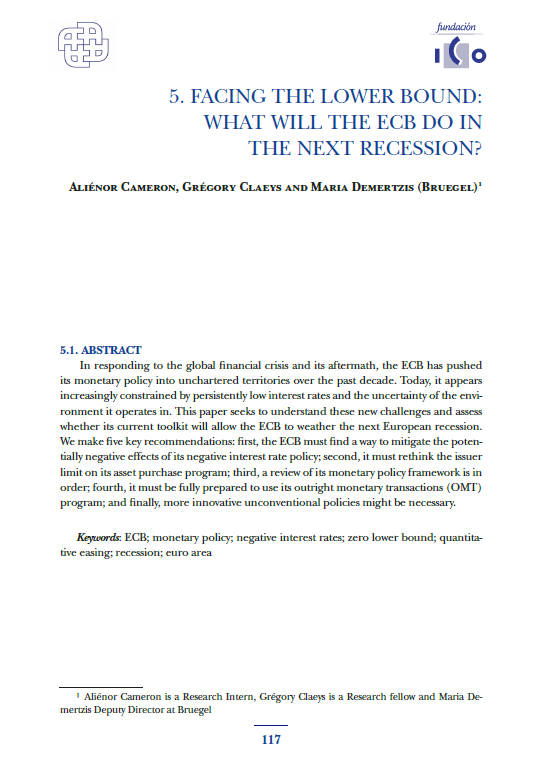External Publication
Facing the lower bound: what will the ECB do in the next recession?
In responding to the global financial crisis, the ECB has pushed its monetary policy into unchartered territories . Today, it appears increasingly constrained by persistently low interest rates. This paper seeks to understand this challenge and assess whether its toolkit would allow the ECB to weather a European recession.
This paper was written in October 2019. It is a chapter of the report “The Euro in 2020, A Yearbook on the European Monetary Union”, edited by Fernando Fernández Méndez de Andés, available here.
In responding to the global financial crisis and its aftermath, the European Central Bank (ECB) had to push its monetary policy into unchartered territories. In the last decade it has expanded its toolbox significantly with the introduction of negative rates, generous refinancing operations for banks, forward guidance, large-scale asset purchases, and tools to restore the transmission mechanism in all EMU countries.
As a result, the situation has improved in the euro area: deflation risks have abated, the economic recovery that started in mid-2013 has accelerated, investment has picked up, and unemployment has fallen considerably in the euro area as a whole.
However, since mid-2018, signs of deceleration have been piling up, as the euro area
has been heavily affected by global trade tensions. Major euro-area countries, including Germany and Italy, might already be in a technical recession. After peaking at around 2% at the end of 2018, headline inflation has decelerated in recent months, market expectations have decreased to near their lowest historical levels, and core inflation is still stuck close to 1%. In addition to this cyclical challenge, it remains unclear what the
‘new normal’ of the post-crisis period really looks like, and how the ECB’s new and more traditional tools will fare in it.
Therefore, the most important question today is whether the ECB’s updated toolkit will be sufficiently robust and well-calibrated to fend off a new European recession.
One major issue is the impact that “low-for-long” (or even negative) interest rates will have on the economy. The ECB might not be able to indefinitely cut its policy rates without reaching a lower bound under which the transmission channel breaks down and its policy rates end up having an overall contractionary effect. Whether this threshold has already been reached is a point of contention, but it is clear that even if it has not, the
ECB might be approaching it.
Its most traditional instrument being constrained, the ECB has, since 2007, increasingly had to rely on unconventional policies to stimulate economic growth and to bring inflation back towards 2%. Due to their relative novelty, the effects these instruments have on the economy are still uncertain and their calibration is more difficult, especially now that government yields are already very low. Moreover, after restarting its sovereign debt purchases in November 2019, the ECB will very soon face its self-imposed limit on this crucial unconventional tool.
This means that its two most important tools to face recessions and deflationary pressures – rate cuts and quantitative easing – could become insufficient in the next crisis.
Beyond these constraints weighing on its main instruments, other factors of uncertainty might also impact the transmission of the ECB’s monetary policy to the real economy. These include the possible weakening of the link between unemployment and inflation (i.e. the Phillips curve) as well as the remaining incompleteness of the EMU. Beyond that, the thread of reversing globalization and indeed the digital transformation further complicate our understanding of the “new normal” that policy makers will be asked to manage.
The ECB will thus have to put in place a systemic approach to manage this uncertainty, by designing monetary policies which are flexible enough to produce good outcomes given a variety of unpredictable circumstances. Communication will be crucial for the ECB to manage expectations and achieve its objectives.
To this end, we make five key recommendations for the ECB to better prepare itself in the case of a new European recession: first, it must find a way to mitigate the potentially negative effects of its negative interest rate policy (NIRP); second, it must rethink the current issuer limit on its asset purchase program (APP); third, a review of its monetary policy framework is in order; fourth, it must be fully prepared to use outright monetary transactions (OMT); and finally, it should be ready to be innovative again if its current
toolkit is insufficient.










